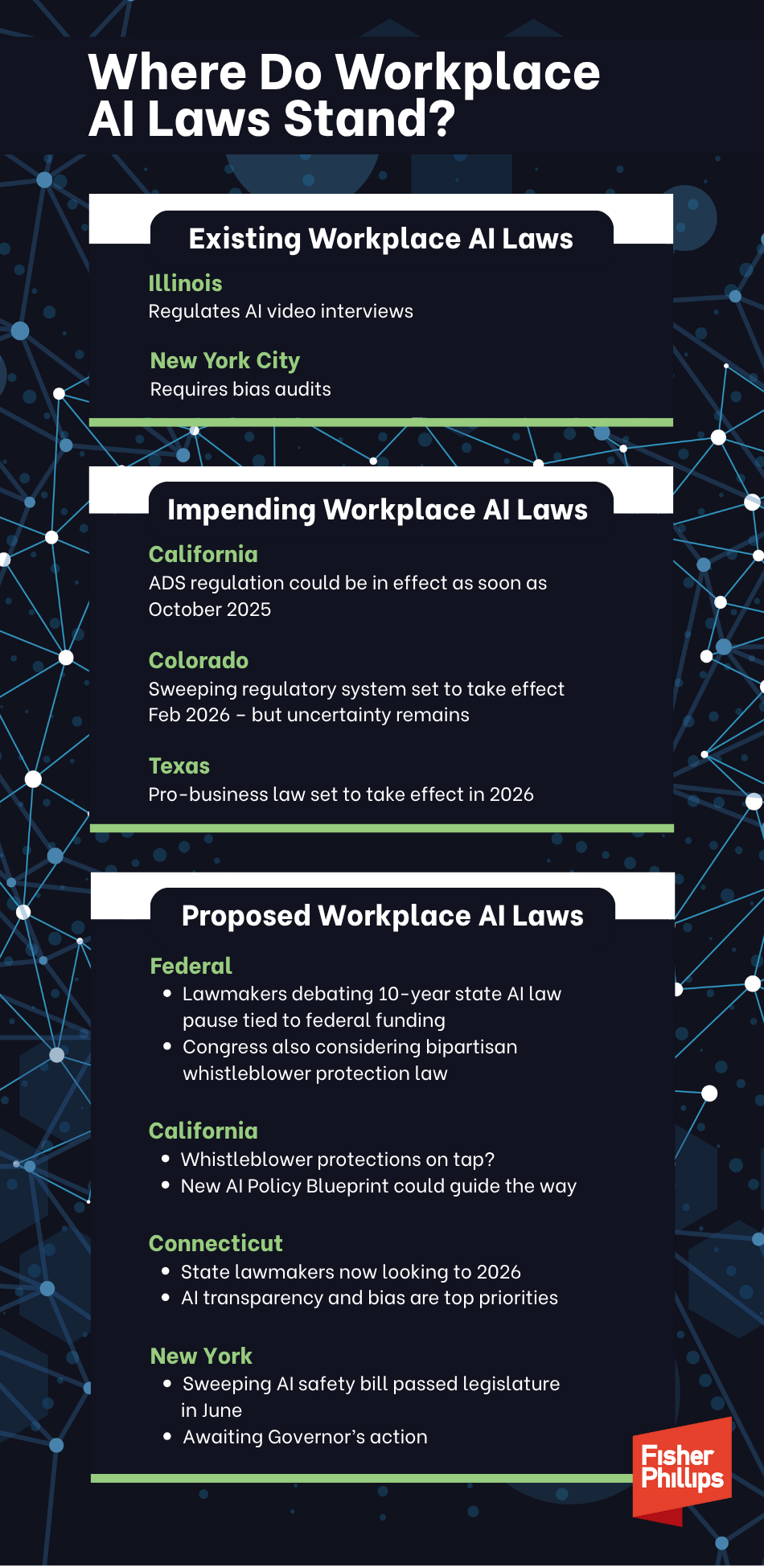Congress may be debating whether to slam the brakes on state-level AI laws for the next decade, but state lawmakers aren’t waiting around for the outcome. From active regulations to proposed bills, states are moving full speed ahead to define how AI technologies – especially in hiring and employment – can and should be used. Whether your business operates in one state or many, wrapping your hands around this patchwork of evolving rules will be essential for workplace management and compliance. Here’s a rundown of what’s already in effect, what’s coming soon, and what’s still under consideration.
What’s Happening in Congress?
[Ed. Note: The Senate killed the state AI law pause proposal on July 1, clearing the way for state regulation of AI use in the workplace. Read more here.]
The Senate parliamentarian recently gave the green light to a controversial provision in the GOP’s legislative package to require states to pause AI regulation for the next 10 years if they want access to billions in federal tech funding. This ruling paves the way for the law to be included in the final budget bill, and means the federal government could soon have a heavy hammer to force states from taking individual action to regulate AI. However, the bill’s future is far from guaranteed. Debate is fierce over whether states or the federal government should lead on AI and employers should be prepared either way.
🔗 More on the federal AI law pause proposal
|
💥 FP’s AI Conference will focus on the future of AI regulation and what your business needs to do to prepare. We’ll hear from two members of the bipartisan House Task Force on AI, as well as state lawmakers and analysts – register now to hear first-hand about AI regulation and much more! |
Existing AI Laws Impacting the Workplace
New York City’s Bias Audit Law
NYC’s Local Law 144 – the first local AI law in the country that regulated the workplace – has been requiring employers using automated employment decision tools (AEDTs) to conduct annual bias audits and notify candidates and employees about their use since 2023. If your business uses AI in hiring in New York City, even remotely, you may be covered.
🔗 Are you compliant with NYC’s AI rules?
Illinois Regulates AI Interviewing
Under the Illinois Artificial Intelligence Video Interview Act, employers using AI to analyze video interviews must notify candidates, obtain consent, and share how the technology works. Noncompliance could lead to lawsuits or enforcement actions.
🔗 Key takeaways for Illinois employers
Impending AI Laws Impacting the Workplace
Will Colorado’s Landmark Law Take Effect in 2026?
Colorado’s SB 205 is slated to create the most detailed AI regulatory scheme in the country, imposing significant obligations on businesses using “high-risk” AI systems, including employment-related tools. Starting in 2026, employers will be required to conduct impact assessments, disclose AI use to individuals, and take steps to mitigate discrimination. But rumblings persist from state leaders that the law may be delayed or watered down prior to the February 1, 2026, effective date. You’ll need to prepare as if the law will take effect as scheduled – but stay nimble in case last-minute changes take place.
🔗 Colorado’s landmark AI law, effective 2026
California Regulators Enter the Chat
California regulators are in the process of adopting new procedural rules to enforce anti-discrimination laws as they apply to automated decision systems (ADS). This will give agency officials a clear path to investigate and penalize employers whose AI systems result in discriminatory outcomes. They could take effect as early as October 1, 2025, but this date could change as the administrative process continues.
🔗 New rules for AI-related discrimination in California
Texas Passes Pro-Business Law
Texas surprised everybody when it enacted a law requiring a detailed study of AI’s impact on jobs, bias, and transparency – but the pending law presents few if any regulatory challenges for employers. In fact, it will prevent aggrieved workers from relying on a “disparate impact” theory when advancing AI discrimination claims when it takes effect on January 1, 2026.
🔗 Texas passes business-friendly AI legislation
Proposed Workplace AI Laws
Congress Considers Whistleblower Law
A bipartisan proposal in Congress would create whistleblower protections for employees who report risks or misuse of AI tools in the workplace. The proposed law would cover retaliation claims and encourage internal reporting mechanisms.
🔗 Congress considers AI whistleblower protections
California Teeing Up Big Plans
After a tumultuous 2024 legislative session that saw no substantive AI bills take effect, state lawmakers are considering a number of potential workplace-related bills that will be finalized by September 12, including a whistleblower protection proposal that pales in comparison to last year’s attempt at regulating AI. But California released a landmark AI Policy Blueprint in June outlining its future regulatory goals. The blueprint identifies key workplace risks, including bias, surveillance, and fairness, and urges legislative and agency action. Expect formal proposals to follow in 2026.
🔗 California unveils forward-looking AI policy framework
Connecticut Looking Towards 2026
Although an omnibus AI regulatory measure didn’t survive the 2025 session, Connecticut lawmakers are still reviewing internal committee reports on AI governance and workforce impact with an eye toward 2026. While no standalone workplace AI bill has been identified for action, the Connecticut legislature will address AI transparency and bias as top priorities in the near future.
New York Awaiting Word from Governor on AI Safety Proposal
SB 5668 (The RAISE Act) would require developers of advanced AI systems to implement safety protocols and disclose testing documentation. Lawmakers passed the bill in June, and it awaits action from Governor Hochul – who is hearing concerns from tech leaders about the potential negative impacts it could have on the state if adopted. If she signs it into effect, it could creating ripple effects for employers who deploy such tools.
🔗 More on New York’s pending AI law
|
Want to Learn More About AI Regulation? 📃 Join Fisher Phillips for our third-annual AI Conference for business professionals this July 23 to 25, in Washington, D.C. Learn more and register here. |
Conclusion
If you have any questions, contact your Fisher Phillips attorney, the authors of this Insight, or any attorney in our AI, Data, and Analytics Practice Group or on our Government Relations team. Make sure you are subscribed to Fisher Phillips’ Insight system to receive the latest developments straight to your inbox.





